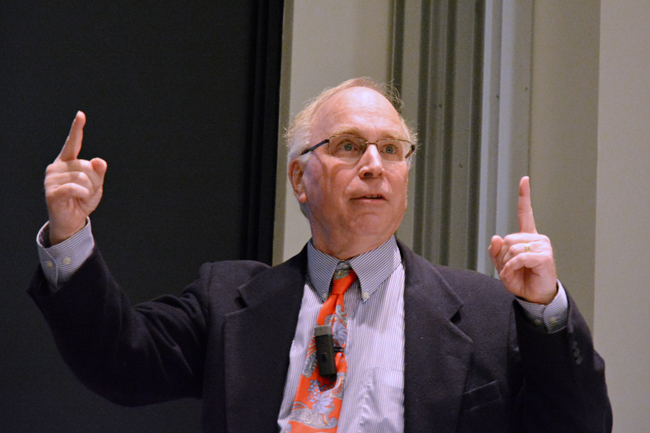The discovery that nearly all stars have orbiting planets was a major step in the search toward finding worlds similar to ours, according to research professor William Cochran.
In a speech in the O’Donnell Jr. Building on Saturday, Cochran discussed the possibility of finding worlds similar to Earth.
NASA researchers launched the Kepler space observatory in 2009 to search for other planets in our galaxy that orbited around a star. The spacecraft found that nearly every star has orbiting planets.
“As we look out to other planets, other solar systems, the first thing that we have to understand is the laws of physics and chemistry appear to be the same everywhere in the universe,” Cochran said.
Scientists must now look for the ingredients to sustain life on a planet to find one like Earth, Cochran said. Those ingredients include a source of energy, a chemical framework and a way for chemicals, such as water, to travel, according to Cochran.
Kaylee O’Neil, an urban studies senior who attended the lecture, said she thinks there is a definite possibility of life on other worlds.
“I don’t know if it’s going to be sentient beings like humans, but I definitely think there is the potential, especially considering the vast number of planets that we know there are,” O’Neil said. “Water typically brings life … and there’s a lot of potential for planets to harbor water, so if given the necessary conditions, there could be life.”
Searching for alien worlds excites physics freshman Hannah Hasson, who said she believes that interest on the subject stems from not only the integration of science fiction into pop culture, but also from human nature.
“I think there’s kind of an inherent human comfort in knowing that we’re not alone,” Hasson said. “It’s definitely a possibility, too — the farthest we’ve been able to get is part of the way through our own galaxy.”
Although scientists have only been able to discover new planets nearby, the possibilities for the future are endless, Cochran said.
“You look back 300 years ago at what society was like and compare it to … today and just the utterly amazing technological advances, I don’t think anyone could have predicted,” Cochran said. “What will happen in another hundred years, thousand years, a hundred-thousand years, a hundred-million years, I can’t even begin to dream.”





















